
The primary elections for the New York City mayoral race will be here in just a few weeks, and the competition is heating up.
The two leading candidates in the Democratic primary are former governor Andrew Cuomo and assemblymember Zohran Mamdani. Incumbent Mayor Eric Adams is running as an independent, and the Republican candidate has once again been chosen as Curtis Sliwa, but neither is polling well for the general election.
Ranked-choice voting could lead to a major upset in mayoral race
This primary is slightly more complicated than others because it uses ranked-choice voting. That means voters can rank up to five candidates on their ballot sheet. If their first candidate is eliminated, their vote will go to the next candidate on their list.
When the votes are tallied, if one candidate wins over 50% of first-choice votes, they win.
If that doesn’t happen, the candidate with the fewest votes is eliminated, and a new round of counting the votes occurs. The candidate with the fewest votes in that round is eliminated.
If your first choice is eliminated, your vote goes to your second choice; if that choice is eliminated, it goes to the third, and so on. This is repeated until only two candidates are left. Then, the candidate with the most votes wins.
This system can lead to some unexpected results. That second choice on the ballot is really important. In a traditional election, if a candidate is lagging, they’ve more or less run out of luck. In ranked-choice voting, however, if they can get people who listed less-popular candidates as their first choice to add them as their second choice, that can boost them to first place in later rounds.
For example, in the 2021 mayoral election, many voters only listed one candidate on their ballot. That led to over 140,000 ballots not making it to the final round of counting because they didn’t include either of the two final candidates. However, if just 5% of those eliminated ballots (about 7,000 votes) had included candidate Kathryn Garcia, she would have beaten Eric Adams.
Due to complex scenarios like that, many are advocating for voters to ensure that they list more than one candidate on their ballot because, in ranked choice voting, a relatively small number of votes can make a big difference. That means that voters should only exclude candidates they really don’t want from their ballot. Listing several options and ranking them in your order of preference is extremely important in this system.
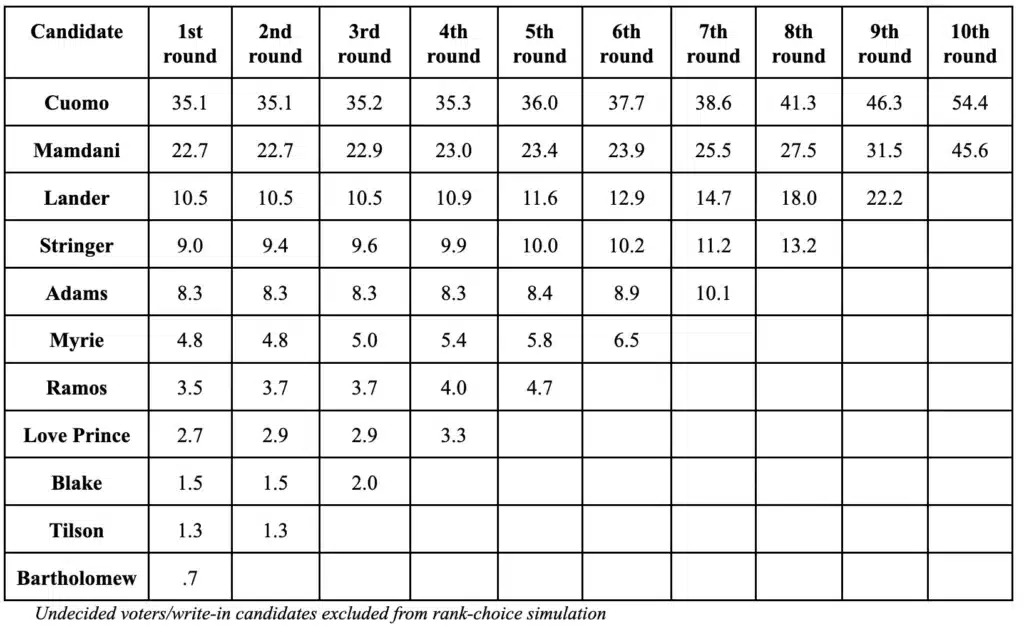
Cuomo has been leading in the polls so far, but Mamdani has been gaining traction. In a recent Emerson College poll, 35% of primary voters supported Cuomo in the first round, while 23% supported Mamdani. The other Democratic candidates fell relatively far behind, with only Comptroller b getting over 10% of voters’ support.
However, in a simulation of how the ranked-choice voting would play out, after 10 rounds of counting, Cuomo would only lead by less than nine points, getting 54.4% of the vote while Mamdani would get 45.6%.
In a poll published about two weeks earlier by the Marist Institute, Cuomo was projected to win in the sixth round of counting, securing 60% of the vote while Mamdani earned 40%.
The Marist poll had similar first-choice results compared to the later Emerson College poll, with Cuomo securing 37% of first-choice votes and Mamdani earning 18%.
Do New Yorkers actually care what the mayor thinks about Israel?
While candidates’ statements about Israel have been getting a lot of attention in the news, most New York voters say they don’t care that much what the mayor thinks about the Jewish state.
The Emerson College poll found that 46% of voters don’t think it’s important that the next mayor of New York City take a pro-Israel stance, while 33% believe it is. Twenty-one percent of voters have no opinion on the issue.
Instead, most voters say they want the mayor to focus on public safety and crime.
A March poll by Emerson College found that those were the top priority for New York voters, followed by housing, the migrant crisis, healthcare, homelessness, jobs, and education.
!function(){“use strict”;window.addEventListener(“message”,(function(a){if(void 0!==a.data[“datawrapper-height”]){var e=document.querySelectorAll(“iframe”);for(var t in a.data[“datawrapper-height”])for(var r,i=0;r=e[i];i++)if(r.contentWindow===a.source){var d=a.data[“datawrapper-height”][t]+”px”;r.style.height=d}}}))}();For Jewish voters – who make up about 16% of the Democratic electorate – crime is also a major concern, especially hate crimes.
The vast majority of Jewish Democrats in New York said they feel that the rise of antisemitic hate crimes is a very serious problem, the city needs to do better at fighting these crimes, and Jewish New Yorkers deserve more respect than they’re getting from elected officials.
Jewish voters across the political spectrum appear to be concerned about who could secure the Democratic candidacy. The Jewish Voters Action Network found that over 4,000 Jewish voters previously registered as independents or Republicans recently registered as Democrats in order to vote in the closed primaries. Remember, that’s not far from the number of votes that could have completely flipped the results of the 2021 race.
So far, the top three candidates for Jewish voters have been Cuomo, Mamdani, and Lander. In recent polls, Cuomo leads among Jewish voters, with Mamdani and Lander neck and neck for second place. Thirteen percent of Jewish voters are still undecided.
Let’s take a look at the leading candidates and their records on Israel and antisemitism.
Andrew Cuomo
Andrew Cuomo has been leading the polls since early this year, although Mamdani has been gaining on him.
In a theoretical situation where Cuomo is the Democratic candidate, he’s expected to get 44% of the vote, with 13% going to Republican candidate Curtis Silwa, 10% going to Eric Adams, and 7% going to independent Jim Walden, according to a recent Emerson College poll. Twenty-six percent of voters said they are still undecided.
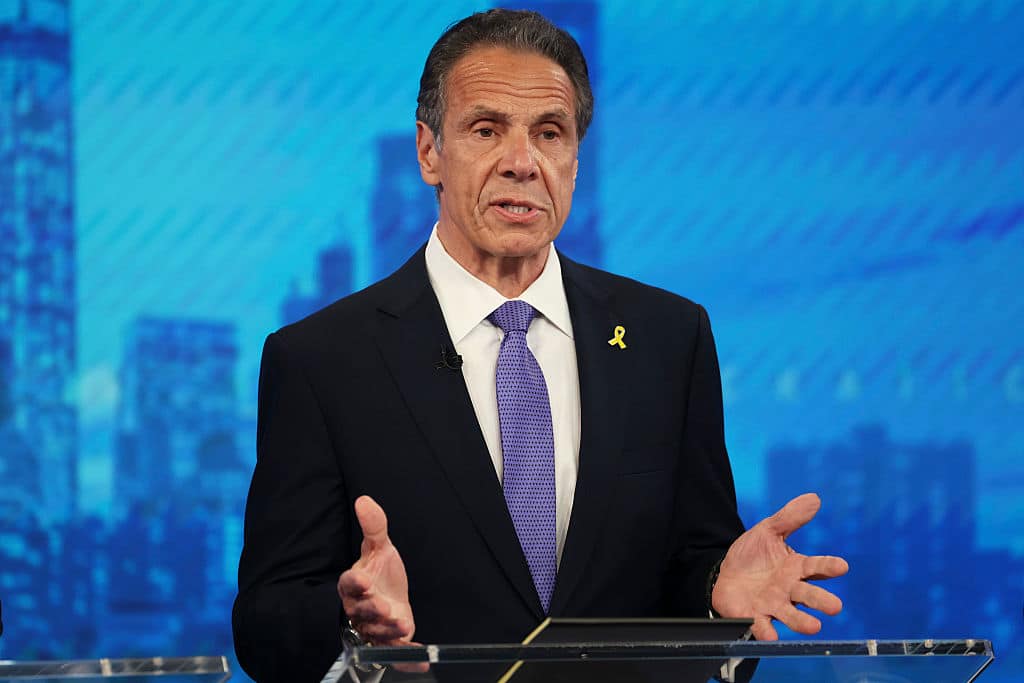
Cuomo resigned as New York governor in 2021 due to allegations of sexual misconduct and controversy concerning his handling of the COVID-19 pandemic.
Throughout the race, Cuomo has argued that he has a strong history of fighting antisemitism and supporting Israel. He’s also argued that his opponents — especially Mamdani — are anti-Israel and antisemitic, tying them with the Democratic Socialists of America, an organization which has been staunchly anti-Israel.
Cuomo committed to instituting the IHRA definition of antisemitism (Read more about that definition here) in the municipality. Cuomo said he will develop a dedicated public safety plan in collaboration with Jewish community leaders, law enforcement, and civil rights experts to fight antisemitism. He’s also committed to promoting curriculum reforms to respond to antisemitism in schools.
He also claimed he will hire 5,000 more police officers to bolster public safety, including 1,500 in the subways.
In comments to a recent UJA-Federation of New York town hall, the former governor condemned the anti-Israel protests that took place on many college campuses and said he would have acted strongly against such demonstrations when they broke the law. He added that he would have had every Jewish student walked to class if that’s what it took to restore security.
While Cuomo expressed appreciation for Donald Trump’s stances against antisemitism, he stressed that he felt the president “took it a step too far” and stepped on academic freedom.
Cuomo called for proactive action against antisemitic rhetoric.
“You have to stamp it out like a small fire in brush, because the fire will grow. We’ve seen that time and time again. We have to be active in actually attacking it. We’re on defense. There’s no reason for us to be on defense. The law is on our side. History is on our side. Attack it, have zero tolerance,” Cuomo said.
Cuomo added that he supports the right to peaceful protest and that he “draws the line” at breaking the law. “You have no right to intimidate, harass, or menace. If you do it motivated by race or religion, that is a hate crime.”
Cuomo pointed to Mamdani’s “Not on our dime!” act, arguing that it was too vague and could target any aid to Israel, even aid to a food bank.
Cuomo argued he could stand up to Trump on issues they disagree on, pointing to disagreements he had as governor with the executive during the COVID outbreak. He added that he believes he has credibility with the president and that Trump won’t go “out of his way” to start a fight with him.
Zohran Mamdani
Zohran Mamdani, a member of the Democratic Socialists of America, has been gaining in the polls in recent weeks.
In a theoretical situation where Mamdani is the Democratic candidate, he’s expected to get 35% of the vote, with 16% going to Republican candidate Curtis Silwa, 15% going to Eric Adams, and 6% going to independent Jim Walden, according to a recent poll by Emerson College. That leaves about 28% of voters as undecided yet.
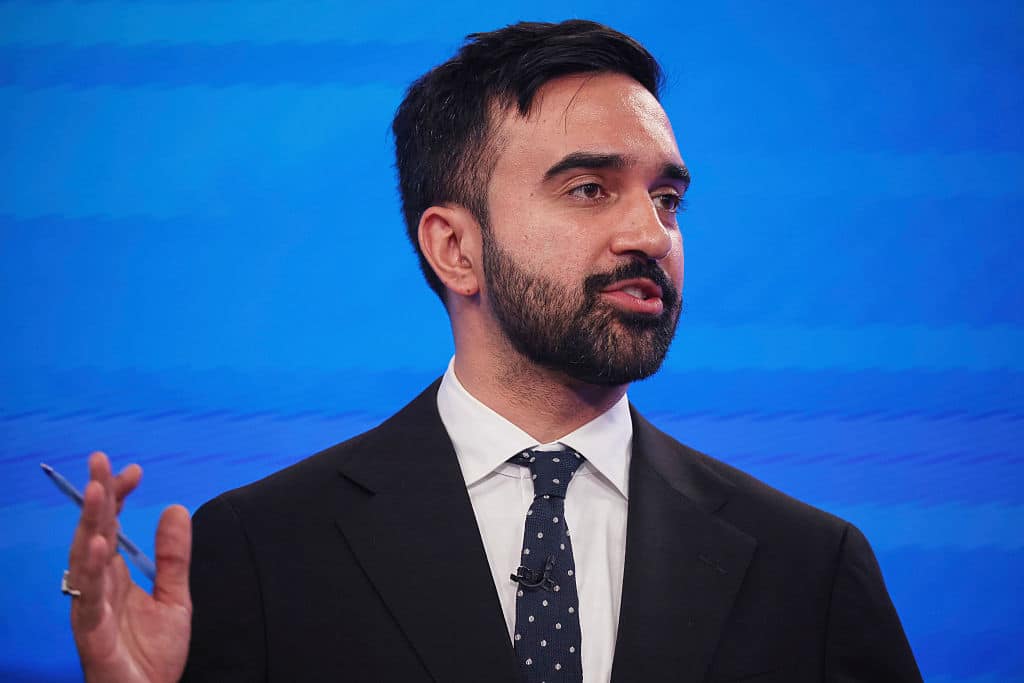
Mamdani’s stances on Israel and antisemitism have come under a lot of scrutiny throughout the race, both from pro-Israel and anti-Israel voters.
The Queens assemblyman has repeatedly accused Israel of committing genocide in Gaza.
His first accusation of genocide was made just six days after the Oct. 7 attacks, when he posted that “We are on the brink of a genocide of Palestinians in Gaza right now – and the manufacturing of consent for sending even more US arms to Israel. Now is the moment for all people of conscience to call for a ceasefire and no more military funding.”
In a recent interview with the Forward, Mamdani stressed that “what led me to make that remark was a fear based on the statements we were seeing from a number of Israeli leaders that characterized Palestinians in language more befitting animals than people, and actions that had been taken to shut down civilian access to basic goods.”
On Oct. 7, within hours of Hamas’ attack on southern Israel, the Democratic Socialists of America issued a statement stressing that “Today’s events are a direct result of Israel’s apartheid regime—a regime that receives billions in funding from the United States. End the violence. End the Occupation. Free Palestine.”
The statement did not directly reference Hamas or the killing of Israeli civilians. It did, however, emphasize that the attacks were “not unprovoked.”
The DSA added in its statement at the time that it was working with Mamdani to pressure “elected officials to stop providing financial support to the Israeli state.” It also called for supporters to “take to the streets to join a protest for peace and against funding the Israeli state.”
Mamdani took part in pro-Palestinian protests in the weeks after the attacks, leading chants such as “Netanyahu, you can’t hide, we charge you with genocide” and “Not another nickel, not another dime. No more money for Israel’s crimes.”
In an interview with Twitch streamer Hasan Piker, Mamdani did not express opposition to Piker’s comments about Israel and Jews, many of which have been blasted as antisemitic.
Among those comments, Piker has said that “it doesn’t matter” if Hamas raped Israeli women on Oct. 7, called violent attacks on American Jews the “natural” response to the war in Gaza, and called Orthodox Jews “inbred.”
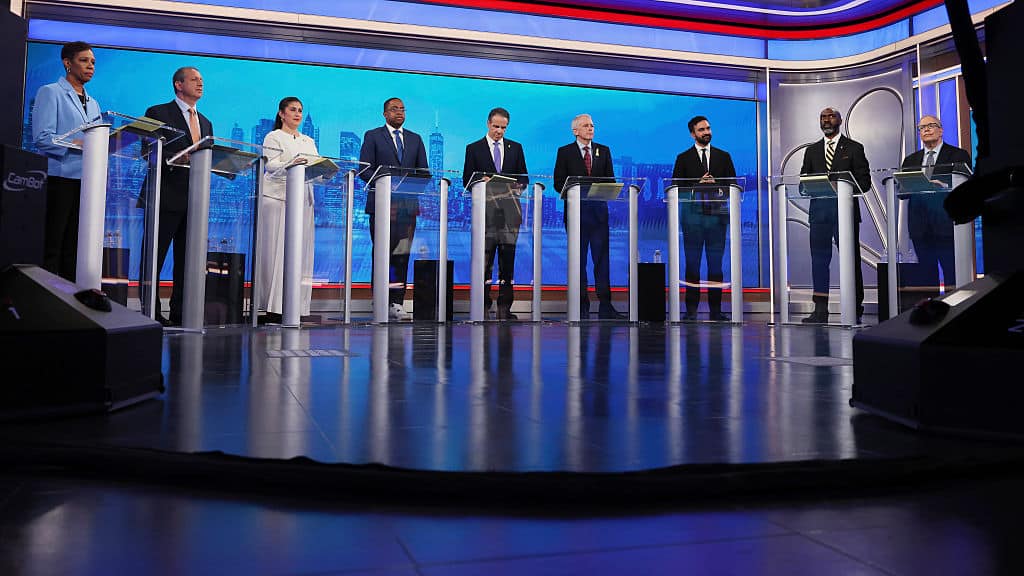
Mamdani justified speaking with Piker, stressing that he is “willing to speak to each and every person” about his campaign.
“For far too long we’ve seen, especially in our party, an inability to speak on platforms that we know so many are listening to and engaging with simply because we have disagreements with those that host those platforms. And it’s high time for us as Democrats to take every opportunity to make our case and to ensure that we are not enclosing ourselves in smaller and smaller bubbles as we see a right wing fascist movement take over this country and threaten the very lives of our neighbors that we are trying to defend,” Mamdani told Politico.
In the recent Forward interview, the assemblyman condemned the Oct. 7 attacks committed by Hamas as a “horrific war crime” and rejected pro-Palestinian protesters who celebrated the attacks as “not befitting of a movement supporting universal human rights.”
Mamdani also condemned the recent shooting attack in which were killed outside the Capitol Jewish Museum.
When asked at a recent UJA-Federation of New York town hall how he felt about some of his supporters expressing outrage at his condemnation of recent attacks on Israelis and Jews, Mamdani said that he would “caution anyone against understanding Twitter to be real life” and that his statements were “consistent with my belief in universal human rights and humanity.”
At a protest in 2021, Mamdani said that pro-Palestinian activism is central to his politics and that he is staunchly anti-Zionist.
“It is Palestine that brought me into organizing, and it is Palestine that I will always organize for,” Mamdani said, adding, “Anti-Zionism is not antisemitism, and in the anti-Zionist movement that I believe in and belong to, there is no room for antisemitism.”
Mamdani also supports the Boycott, Divestment, and Sanctions movement, which has called for a boycott against Israel. In the UJA-Federation of New York town hall, Mamdani stressed that the BDS movement is a “legitimate movement” and “is consistent with the core of my politics, which is non-violence.”
Over the past two years, Mamdani promoted a bill known as the “Not on our dime!” Act, which calls to end “New York funding of Israeli settler violence.”
The bill would remove the non-profit status of any organization found to be “aiding and abetting activity by the Israeli armed forces, the government of Israel, or citizen thereof, that is illegal pursuant to the Rome Statute of the International Criminal Court or under any of the international treaties signed at Geneva on August 12, 1949, as amended, or any protocol to such convention to which the United States is a party.”
The bill would also allow the attorney general to sue any organization deemed to be violating the act for at least $1 million.
Critics have argued the bill is antisemitic because it singles out Israel, while not requiring the same divestment from organizations supporting other countries — including those with documented human rights violations. They’ve also said the bill delegitimizes Israel and presents a “harmful, one-sided, divisive approach which fans the flames of hatred that threaten us all.”
Mamdani has argued that singling out Israel is justified due to the political sensitivity of the Israeli-Palestinian conflict, which he says discourages the enforcement of existing laws.
In New York state, the attorney general already has the right to investigate charities for wrongdoing,” he told Jewish Currents. “[But] when it comes to [settlement-funding] nonprofits, there is no application of existing law. When it comes to Israel in this country, it is necessary to be explicit.”
Mamdani has said he believes Israel has a right to exist, but it’s unclear if he thinks it has the right to exist as a Jewish state. During the UJA town hall, he responded to a question on the issue by saying, “I believe Israel has a right to exist, and it has a right to exist also with equal rights for all.”
Mamdani has also said he would order the arrest of Israeli Prime Minister Benjamin Netanyahu if he visits New York City due to a warrant issued by the International Criminal Court.
When asked by the Forward if he would implement any kind of anti-Israel boycott as mayor, Mamdani answered: “If there are ways in which Mayor Eric Adams has supported the violation of international law, I would absolutely bring that to an end — because I think what New Yorkers deserve is a city in compliance, whether it’s legal compliance with campaign finance or its compliance with international law.”
Politico reported recently that Mamdani did not sign onto two State Assembly resolutions memorializing the Holocaust and recognizing Israel this year.
Mamdani insisted that he did vote for the resolution memorializing the Holocaust and has done so every year. The record of the vote is not available online.
Concerning the resolution about Israel, Mamdani’s spokesperson, Andrew Epstein, told Politico that he didn’t support it because of language that says Israel “continues to strive for peace with security and dignity for itself, its neighbors and throughout the world in order to fulfill the prophecy of becoming a light unto the nations.”
Mamdani sponsored 10 resolutions since January, including one about the Lunar New Year that was passed just a day after the resolution on Holocaust Remembrance Day. He says that this was because he was automatically added to these resolutions without any action on his part.
“In January, I told my Assembly staff not to co-sponsor any resolutions that were emailed to our office,” Mamdani said in an Instagram reel. “If I’m on a resolution, it’s because I was automatically added. I created this blanket policy because I wanted to focus on the substance of legislation. It had nothing to do with the content of the resolution, but I understand this has caused pain and confusion for many.”
“In this election, we’re seeing the real crisis of antisemitism, and the pain of Jewish New Yorkers being weaponized as a political talking point,” Mamdani added. “As mayor, I will protect Jewish New Yorkers, and build a city that every person can be proud to call home.”
Mamdani stressed that he has repeatedly supported allocating millions of dollars in the state budget for Holocaust survivors and that his campaign has proposed the largest budget compared to any other candidate to combat antisemitism.

Concerning the fight against antisemitism, Mamdani has said he wants to increase the funding for anti-hate crime programs by 800% and form a Department of Community Safety.
According to his platform, the new Department of Community Safety would increase funding for hate violence programs from the current $3 million to about $26 million.
The Department would invest in approaches to prevent violence through education and community-building; provide community-based bystander training and rapid response at the local level; and implement restorative justice, counseling, and peer-support. Youth-focused anti-hate programming will also be bolstered, among other initiatives.
Part of the idea behind the Department is to set up social, educational, and mental health programs to fight the root causes of crime, with the belief that this will free up police resources to focus on enforcement.
Mamdani has also committed to appointing a senior advisor for antisemitism and would be excited to partner with Jewish organizations to develop a curriculum that would express the diversity of New York, including Jewish culture and history.
Concerning adopting the IHRA definition of antisemitism, Mamdani said he models his definition off of the Biden Administration’s National Strategy to Counter Antisemitism, which he said “takes a comprehensive approach to the issue.”
Brad Lander
Lander, who currently serves as the New York City Comptroller, is Jewish himself.
Lander told the UJA-Federation of New York town hall that while protesters should be allowed to hold peaceful demonstrations against Israel, there also needed to be a balance struck to “turn do the temperature” to prevent violence.
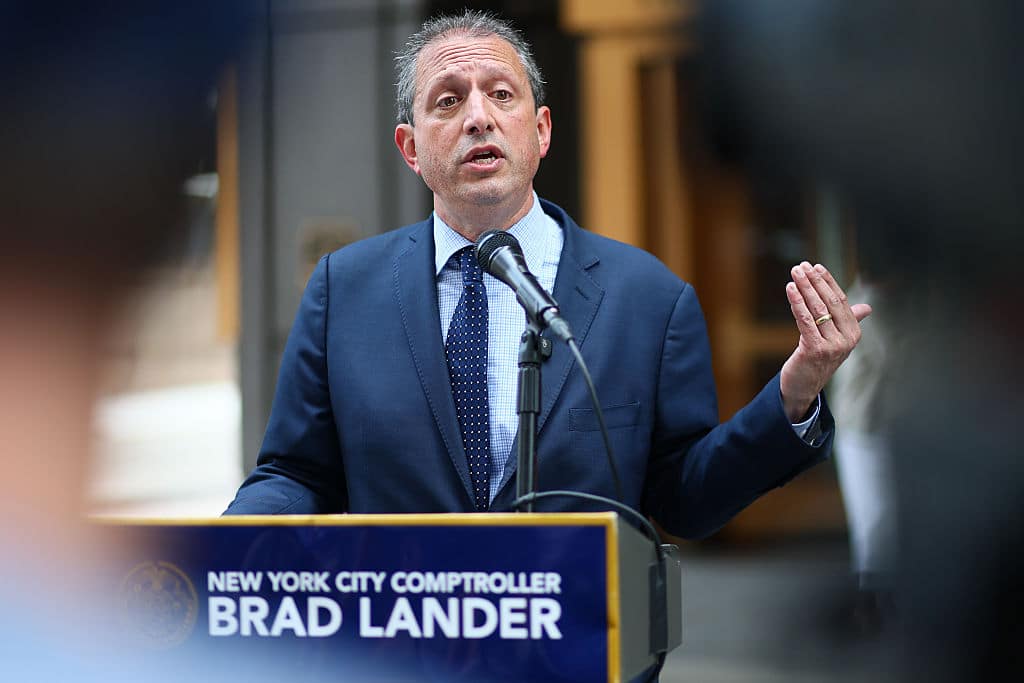
At the town hall, Lander described himself as a “liberal Zionist” and stressed that he believes that “Israel can best be a Jewish and democratic state, in the spirit of its Declaration of Independence, open to the ingathering of the exiles, inspired by our prophets, that also provides full social and political equality for everyone when it is not occupying the West Bank and Gaza and when there is mutual recognition and safety and freedom and peace for Israelis and for Palestinians.”
Lander also expressed reservations about characterizing certain anti-Israel slogans as antisemitic, such as “Free Palestine” and “Globalize the Intifada.” He stressed that the First Intifada was “relatively non-violent” and argued that the language was vague enough that protesters could mean just fighting for the human rights of Palestinians or they could mean committing violence: “Second path? Absolutely antisemitic. First path? Too vague.”
“If you’re the mayor, and someone says ‘globalize the Intifada,’ you can’t tell the NYPD to arrest them just because they said it. That is free speech,” Lander told the town hall. “But you could say, ‘Hey, I think we should have a conversation here, because I’d like you to understand what happened in the Second Intifada and why, when you say it in that context, Jews are now afraid that you are saying to commit violence against them anywhere in the world.”
Lander argued that a good mayor would create dialogue between different communities to fight hate, such as by lifting up the voices of pro-Palestinian activists who have condemned violence and hate.
Lander defended his relationships with more far-left politicians in New York, saying, “I think it’s valuable to keep a broad set of relationships and try to build them across divides.”
The Comptroller has colorfully rejected criticism from Cuomo concerning his connections with anti-Israel figures. In a press conference in April, Lander responded to Cuomo’s criticism with the Yiddish phrase “A beyzer gzar zol er af dir kumen” (meaning “may an evil decree come upon him”).
“Andrew Cuomo doesn’t get to tell me how to be Jewish,” Lander said. “Non-Jews weaponizing antisemitism to score political points — especially, but not only, by attacking proud Jews — is offensive and dangerous.”
While Lander opposes the BDS movement, he supported Ben & Jerry’s decision to stop selling ice cream in the West Bank in 2021.
Lander has taken part in a weekly rally in New York calling for a permanent ceasefire and the release of all the hostages, while also criticizing the handling of the war by Israel.
The comptroller argued that he has released “the most comprehensive plan in this race…to combat the rise in hate crimes and antisemitism.”
“Over a decade as a City Councilmember in a district with a large number of Jews and Muslims, I consistently organized against antisemitism, Islamophobia, anti-Asian hate, anti-LGBTQ bias, racism, and white supremacy, and brought people together to stand up to hate – through dialogue, education, rallies and vigils, and through partnership with community and faith organizations, and with law enforcement,” said Lander.
Concerning adopting the IHRA definition of antisemitism, Lander said he would follow the White House Strategy to Combat Antisemitism, which built upon multiple definitions, including the IHRA definition and the Nexus definition.
“Given good-faith disagreements within our community over definitions, I don’t believe it is effective to focus on the differences in definitions of antisemitism, but instead to build unity in fighting it,” Lander said.
In his platform, Lander has committed to adopting technology and measures to fight hate and extremism. One effort he wants to promote would focus on identifying early warning signs of extremism on social media and gaming platforms.
Lander also wants to use public education and accessible search data to connect at-risk individuals with resources and mental health support to prevent them from falling into violent extremism. He also says he intends to bolster the NYPD Hate Crimes Task Force and strengthen the New York Office for the Prevention of Hate Crimes through data-sharing between government offices, police, and community organizations.
Another initiative Lander is promoting is for students to receive training to teach their classmates about their history and culture, as well as the forms of bias and discrimination they face, to increase understanding and fight hate. He also aims to increase diverse representation in the education system so students feel they belong and increase their understanding of their peers from other backgrounds.
Lander has also said he will stand up to any pressure the president may direct toward New York, including concerning protests in the city.
“While the Trump Administration weaponizes immigration enforcement without due process, I believe it is imperative that we stand up for the protection of free speech and nonviolent protest, even when we disagree strongly with what’s being said,” the Comptroller said. “This is crucial to protecting our constitutional democracy. Jews have a history of seeing our visa revoked, our rights curtailed, our freedom and our lives threatened.”
Eric Adams
Mayor Eric Adams is running as an independent, so he won’t be competing in the upcoming Democratic primaries.
Last year, Adams was indicted on charges of conspiracy, wire fraud, soliciting illegal foreign campaign contributions from foreign nationals, and bribery. Several city officials linked to the case resigned in the months leading up to the indictment and after.
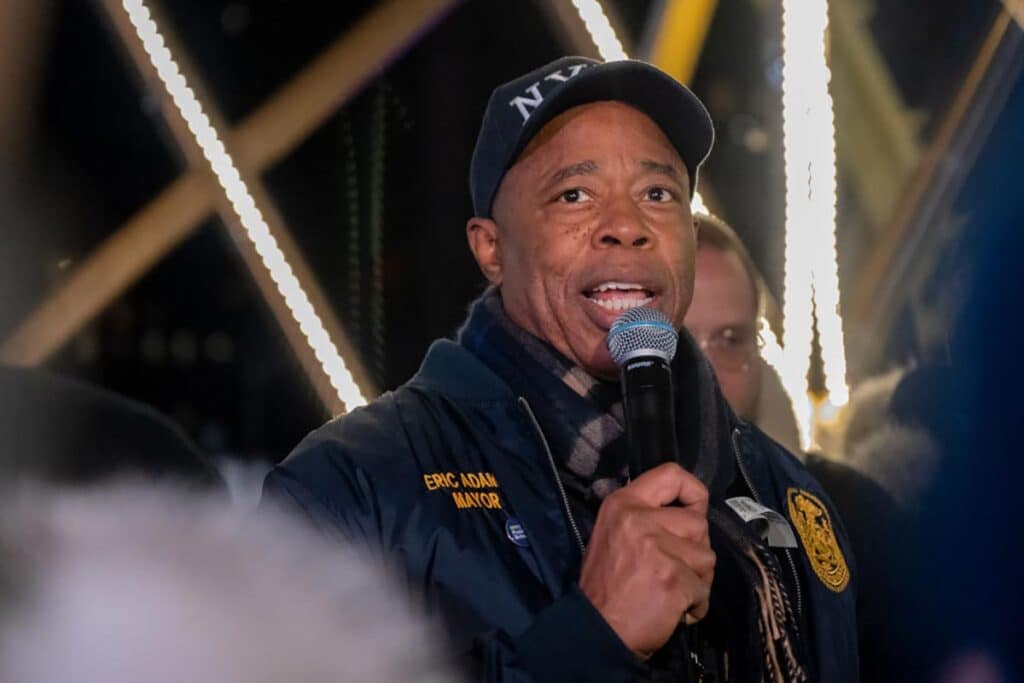
Shortly after Trump was elected, Adams held several meetings with administration officials. In February, the Department of Justice requested that the case be dismissed, and in April, a federal judge dismissed it with prejudice.
Adams is a strong supporter of Israel and has made fighting antisemitism a central part of his campaign.
Last month, Adams announced the creation of a new office to combat antisemitism. The office will launch an interagency task force to coordinate the fight against antisemitism between city agencies and recipients of public funding. The office will also have the authority to ensure city-funded organizations aren’t promoting antisemitism.
The announcement received some criticism from competing candidates, such as Lander who described it as a “cynical” move by Adams “in the waning days of his mayoralty.” Cuomo also downplayed the new office, stressing that fighting antisemitism “is not just a matter of more bureaucracy.”
Additionally, last month, Adams announced a new unit in the mayor’s office focused on building economic ties with Israel.
Every year, I march in the Israel Day Parade to show what I’ve always stood for: protecting New Yorkers from hate. During the Crown Heights riots, the Guardian Angels and I were there defending Jewish families when the city turned its back. We’ve fought antisemitism on the… pic.twitter.com/MssXThc8U3
— Curtis Sliwa (@CurtisSliwa) May 18, 2025
Curtis Silwa
Curtis Sliwa is running as a Republican, so he won’t be competing in the upcoming Democratic primaries. He has already been confirmed as the Republican nominee for the November general election.

